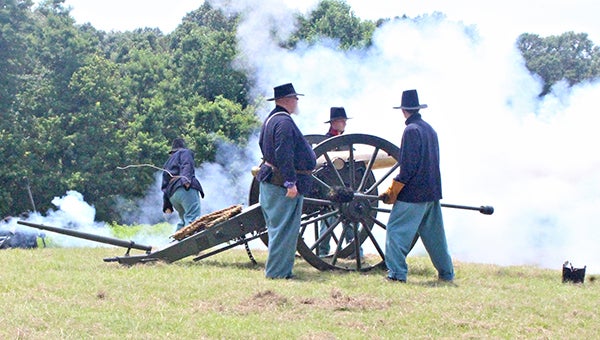This week in the Siege: Confederate defeat seals Vicksburg fate
Published 4:00 am Saturday, May 20, 2023

- Volunteers fire a cannon during a demonstration at the Vicksburg National Military Park in 2021. The Park is commemorating the 160th anniversary of the Siege of Vicksburg this year. (File/The Vicksburg Post)
Editor’s note: This is part of a series of stories commemorating the 160th anniversary of the Siege of Vicksburg during the Civil War.
It was the battle that decided Vicksburg’s fate.
On May 16, 1863, Confederate forces under Gen. John C. Pemberton clashed with Union units under Maj. Gen. Ulysses Grant at the battle of Champion Hill. The Confederates were defeated, forcing Pemberton to withdraw to the Big Black River and then back to Vicksburg, which would later fall under siege by Union forces.
“This event is the deciding battle of Vicksburg because it’s the one that Pemberton leaves the defenses of Vicksburg and arrives at Edward Station and discusses the battle plan,” said Andrew Miller, chief ranger at the Vicksburg National Military Park.
Pemberton, he said, was very indecisive and organized a council of war with his generals to determine what the army should do at that point. Pemberton decided to follow one of his subordinates and moved the army south toward Dillon Plantation instead of following orders from Gen. Joseph Johnston to find a way to link up with Johnston’s forces and then find and destroy Grant.
His troops on the verge of collapse after Champion Hill, Pemberton retreated to fortifications on the Big Black but on May 17 was forced to retreat across the river and burn its bridges.
Gen. William Tecumseh Sherman, who was not involved fighting Pemberton, used a pontoon bridge to cross the Big Black at Bridgeport and led the first Union corps to arrive at Vicksburg to face the 8-mile Confederate defensive front. The remainder of Grant’s army arrived at Vicksburg on May 18, and on May 19, Sherman — whose corps was camped along Graveyard Road — ordered an attack on the Stockade Redan that began at 2 p.m.
“Sherman, watching the attack unfold, realizes within 15 minutes that the attack has failed,” Miller said. “However, the federal forces cannot retreat until dark because they are trapped beneath in the ravines, beneath the Confederate force.
“They were sitting on the bottom of those ravines, hugging the hillside until darkness shrouded the battlefield where they were able to sneak back to their lines. They take just under 1,000 casualties testing out that one location.”
On May 21, after Grant reorganized his force, he called for an all-out assault on the Confederate positions for May 22. The assault began with a massive artillery barrage with troops moving forward at 10 a.m. pushing and testing the Confederate fortifications. The repeated assaults were repulsed after taking heavy casualties.
“At the end of the day, on May 22, Grant is furious,” Miller said. “The Union Army has taken 3,000 casualties trying to assault the Confederate positions in two days, May 19 and May 22, and Grant has lost 4,000 men trying to take Vicksburg.
“The Confederates defending the line, who had been demoralized from the defeats at Big Black River in Champion Hill, will be reinvigorated,” he said. “They understand that the defenses that they have are strong, that the federals cannot take them. Now they’re hopeful in waiting that Johnston will come with his army gathering in the Jackson area to relieve them and defeat Grant.”






